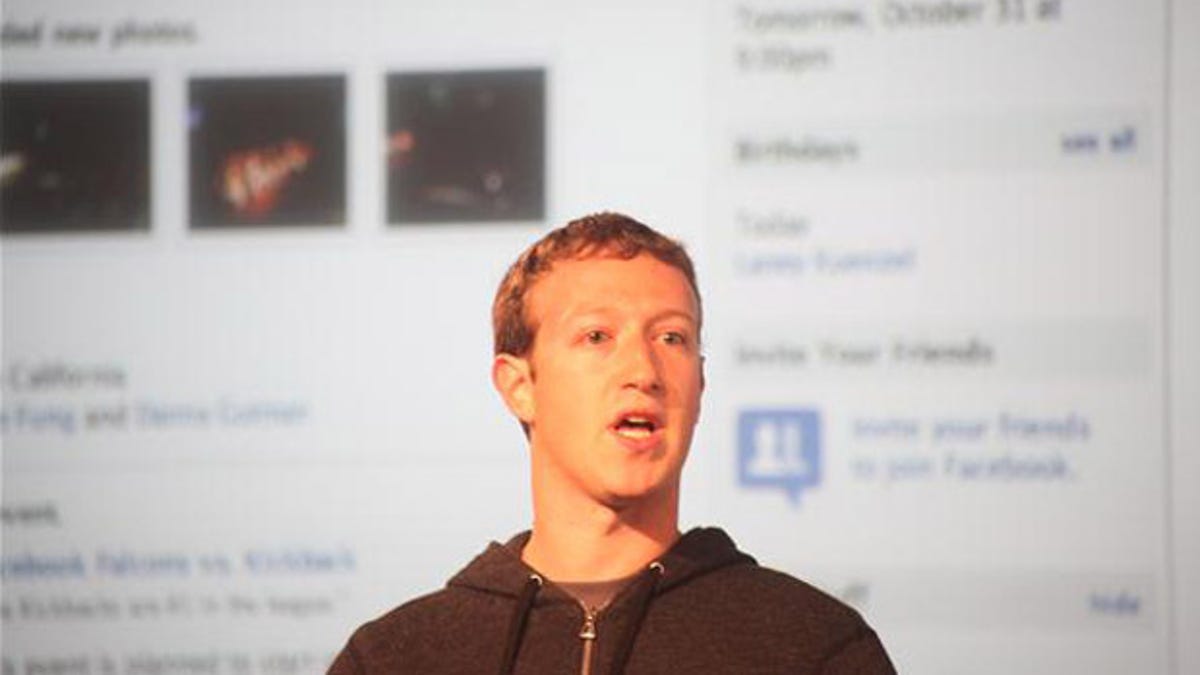Zuckerberg's steady hand paying dividends in latest Facebook earnings
The company's mobile growth is soaring, and its ad business is strong. Now, about all those other initiatives.

When Facebook CEO Mark Zuckerberg and his top lieutenants talked with Wall Street analysts Wednesday perhaps the only real surprise was that there were no surprises.
Facebook, it would appear, has blossomed into your average public company with a steadily growing business. Its formidable captain, who has been able to right a ship that was all but upside down just one year ago, now looks the only man for the job.
The social network had a solid quarter with revenue of $1.46 billion, good enough to beat analyst estimates. It posted acceptable, though not great, earnings per share of 12 cents, when you exclude one-time costs.
The market's reaction to the news has been tempered, which reflects Facebook's new-found steadiness. There were no extreme fluctuations in Facebook's share price following this particular report, something to note as previous earnings reports have caused spikes and dips.
Mobile, of all things, was Facebook's shining star. The company managed to make 30 percent of its advertising revenue, or around $375 million, from mobile. With the achievement, a healthy improvement over last quarter's $306 million in mobile ad revenue, Facebook may have finally put to rest the belief that its social network would be doomed should members shift their attention away from the desktop.
People did indeed migrate -- Facebook now counts 751 million people who visit its mobile apps or mobile Web site each month -- but the company was no worse off.
Advertisers migrated with them, particularly taking advantage of a unit called "mobile app install ads," which let developers promote their mobile applications to Facebook's iOS and Android audiences. The company went on and on about how these units are a prized jewel, even though executives refused to share revenue figures. Facebook said 3,800 developers purchased mobile install ads during the quarter and collectively generated close to 25 million downloads of their apps.
Facebook did its best to brush off another growing concern. The company completely dismissed the "urban legend" that teens are tuning out its social network. Chief Financial Officer David Ebersman reassured investors and analysts that Facebook continues to see high levels of activities from members under the age of 25.
"The younger users remain among the most active and engaged users we have," he said. "Our sense is that much of the concern stems from the assumption that this is a zero-sum game, and that's not how we see it. We think the overall amount of time spent on services that enable you to connect and share is growing and will continue to grow."
Facebook, with Instagram by its side, is secure, so the company would have us believe.
At present, Facebook isn't a $38-per-share company for a number of reasons, one of them being that Wall Street won't soon forget how the social network screwed up its initial public offering. The social network is also on a bit of a spending spree, an investor-unsettling fact first revealed three months ago but reiterated again Wednesday.
And then there are the large question marks hanging over a slew of new, ambitious, and unproven products. Facebook continues to speak of Graph Search, its avant garde social-networking search experience, as a big opportunity, but it refuses to go into detail on specifics. Zuckerberg said he was most excited about the poorly performing Facebook Home, but then only gave the same people-over-apps generic reasoning behind his logic.
The chief executive also loves to gush about how his impulse purchase of Instagram was the find of the century, and he did again today, but we have no clue if the 100 million-member community will help Facebook make money. Instagram is growing at a faster rate than Facebook at its age; that's the gist of the message we got today.
The unknowns haven't put off analysts. Sterne Agee maintains a price target of $37, which means the firm expects to see Facebook's share price climb back around its IPO price, although it predicts that will take another year. And the deliberate no-comments may reflect a conscious decision on Facebook's part to keep expectations reasonable. That's understandable considering how off expectations were when Facebook went public almost a year ago.
Really, the Facebook we saw Wednesday was mature and rational. Monetizing mobile is now just business as usual.

